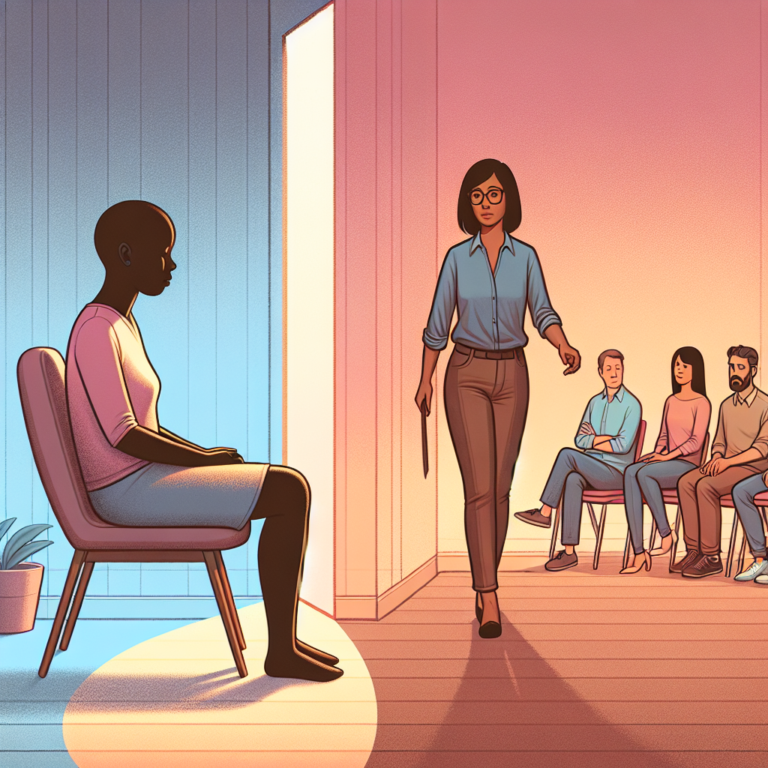
The Power of Connection: Exploring the Impact of Group Therapy on Social Anxiety
Introduction
Social anxiety can feel like a heavy shroud, isolating individuals in a world bustling with connections. Yet, within this apparent solitude lies a transformative remedy known as group therapy. When harnessed effectively, the power of connection can dissolve barriers and foster a sense of belonging that alleviates the burdens of social anxiety. In this comprehensive exploration, we will untangle the impactful threads of group therapy, shining a light on its potential to revolutionize the way we treat social anxiety disorders.
Understanding Social Anxiety
What Is Social Anxiety?
Social anxiety is more than just shyness; it’s an overwhelming fear of being judged, embarrassed, or scrutinized in social situations. This disorder can manifest in various ways, from avoidance of social gatherings to intense physical symptoms such as sweating and increased heart rate. According to the National Institute of Mental Health, approximately 7% of adults experience social anxiety at some point in their lives.
The Isolation Spiral
In a world that favors interaction, social anxiety can lead to a downward spiral of isolation. As individuals withdraw from social interactions, their anxiety deepens, creating a vicious cycle. Understanding this relationship highlights the critical need for effective treatment options.
The Essence of Group Therapy
What Is Group Therapy?
Group therapy is a form of psychotherapy that involves one or more therapists working with a small group of clients. This therapeutic approach leverages the collective experiences of individuals facing similar challenges, facilitating connection and shared learning.
The Therapeutic Environment
Group therapy creates a safe space where members can express their fears, share their experiences, and receive support. This environment fosters a sense of belonging, providing what many with social anxiety crave—validation and understanding.
Benefits of Group Therapy for Social Anxiety
Shared Experiences: Participants discover they are not alone in their struggles, which mitigates feelings of isolation.
Skill Development: Group settings often involve role-playing and exposure exercises that enhance social skills.
Social Support: The encouragement from peers can significantly boost confidence and resilience against anxiety triggers.
- Real-time Feedback: Observing others navigate similar challenges offers practical insights and approaches.
Case Studies on Group Therapy’s Impact
Case Study 1: Sarah’s Story of Transformation
Background: Sarah, a 28-year-old teacher, experienced debilitating social anxiety that impaired her daily functioning. She often avoided staff meetings and social gatherings.
Group Therapy Experience: After joining a local support group for social anxiety, Sarah found immediate relief. Members shared their struggles, creating a bond that eased her feelings of isolation.
Outcome: With continued participation, Sarah improved her communication skills and gradually faced social situations she once avoided. Group therapy offered her practical coping mechanisms and a supportive network.
Analysis
This case underscores the foundational principle of the power of connection—shared experiences dismantling barriers and nurturing hope.
Implementing Group Therapy in Treatment Plans
How to Find the Right Group Therapy Program
Research: Look for licensed therapists specializing in anxiety disorders.
Assess Compatibility: Attend a trial session to gauge personal fit with the group dynamics.
- Focus on Goals: Ensure the group aligns with your therapeutic objectives.
The Role of a Facilitator
A skilled facilitator plays a pivotal role in steering conversations, maintaining group cohesion, and ensuring a safe environment for all participants. Their guidance can significantly enhance the effectiveness of group therapy for social anxiety.
What to Expect in a Session
| Session Component | Description |
|---|---|
| Check-in | Members share recent experiences, fostering connection. |
| Theme Discussion | Focused topics relevant to social anxiety are explored. |
| Skills Practice | Role-playing scenarios to practice social skills. |
| Feedback | Participants provide constructive feedback to one another. |
Addressing Common Misconceptions About Group Therapy
Misconception 1: Group Therapy Is Only for Severe Cases
Many believe that only those with severe social anxiety should attend group therapy. In reality, it is effective for a range of anxiety levels.
Misconception 2: It’s Just Talking
While discussion is key, many sessions incorporate experiential exercises to build coping strategies.
Misconception 3: Participants Don’t Improve
Success stories abound, with many individuals reporting significant progress in overcoming their anxiety.
The Role of Connection in Recovery
Building Relationships
The power of connection lies not only in therapy but also in the relationships formed among group members. These bonds often extend beyond the therapy room, creating lasting support networks.
Encouraging Vulnerability
Group therapy encourages individuals to be vulnerable, demonstrating that truthfulness is a strength, not a weakness. This vulnerability fosters authentic connection and trust among participants.
Catalyzing Personal Growth
Through shared stories, participants are inspired to challenge their limits. They learn that overcoming social anxiety is not just possible but achievable with collective support.
Conclusion
The journey through social anxiety is deeply personal, but it need not be solitary. The power of connection has the potential to empower individuals, transforming fear into strength through group therapy. As we embrace interconnectedness and support, we create pathways toward resilience, healing, and personal growth.
Actionable Takeaway
If you or someone you know is battling social anxiety, consider exploring group therapy. Take the first step toward connection and healing—you’re not alone on this journey.
FAQs
1. How long does group therapy for social anxiety typically last?
Group therapy sessions usually last between 1 to 1.5 hours and may span several weeks to months, depending on the program.
2. Can group therapy replace one-on-one therapy?
While group therapy offers unique benefits, it often complements individual therapy rather than replacing it.
3. What if I’m uncomfortable speaking in a group?
Most group therapy settings allow for gradual participation. Members are encouraged to share at their own pace.
4. Is group therapy suitable for everyone with social anxiety?
Group therapy can be beneficial for many, but it’s essential to assess individual comfort levels and therapeutic needs.
5. How can I measure progress in group therapy?
Many therapists will review goals, achievements, and personal reflections throughout the program to gauge progress effectively.
In closing, the power of connection has profound implications for those grappling with social anxiety. By harnessing this power through group therapy, individuals can reclaim their lives and find solace in shared experiences. The path to overcoming anxiety doesn’t have to be walked alone; the journey can be shared, celebrated, and conquered together.














